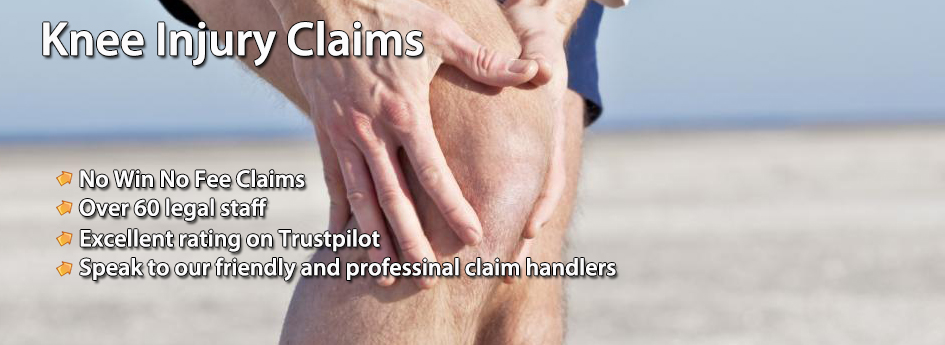If you have suffered a knee injury after an accident at work which was not your fault, you may be entitled to claim compensation.
Know your knees
The knee is the largest and most complex joint in the body. Healthy knees are extremely important for mobility and independence as the knee supports the vast majority of your body weight. Damaged knees can be painful, debilitating and in serious cases life changing. If you have injured your knee in an accident at work because of negligence on the part of your employer, you may be able to claim compensation from the company considered legally responsible.
Causes of knee injuries in the workplace
Injuries to the knee in the workplace are often caused by:
• trips, slips and falls;
• lifting heavy objects;
• running;
• movement in awkward positions;
• kneeling or crouching for long periods of time;
• repetitive work practices that cause or aggravate the knee such as bursitis or housemaid’s knee; and
• injuries from work equipment.
Workplace injuries to the knee can occur from a single incident such as a fall or develop over time, for example, resulting from repetitive kneeling. Your employer has responsibility to ensure that you are working in a safe environment and that your workplace conditions do not cause you any harm.
Types of knee injury
The most common knee injuries claimed for are:
• knee cap damage dislocation or fracture;
• cartilage injury or damage;
• ligament tears and ruptures. A very common knee injury either to the two cruciate ligaments in the centre of the knee or the two collateral ligaments either side of the knee often caused by slips and trips resulting in an unnatural twisting motion in the knee; and
• muscle tears, strains or injury to the quadriceps, hamstrings or calf muscles in the leg used to power the movement of the knee.
If you suffer a knee injury always seek expert medical help. Your health and well being is the main priority. Seeking prompt medical help will not only assist your recovery but should you pursue a claim for compensation, the medical records form an essential part of your case. Minor knee injuries heal with little medical intervention, whereas more serious injuries may require hospital treatment, surgery and physiotherapy. Knee injuries may require several months of rehabilitation before normal activities can be resumed.
Identifying the type of knee injury and the impact it has on your life is critical to making a successful claim for compensation.
Can I claim for my knee injury suffered at work?
Your employer has a duty of care to ensure that you are not put at risk whilst working and provide a safe working environment. Injuries at work are often caused by avoidable situations such as lifting heavy objects or tripping over hazards. However, if your employer has not provided adequate training or safety equipment, you are likely to have a legitimate claim.
All employers and businesses should be insured against injuries to employees in the workplace. It is important to remember that your claim will be against your employer’s insurance rather than your employer directly, which may ease any concerns about the financial implications for your employer of your claim.
The “cruciate” part
The strands to a successful claim are:
• the accident must have occurred in the last three years;
• the accident must have arisen from the negligence or omission of someone else;
• the accident must have caused the knee injury; and
• your employer must be legally responsible for the accident.
It is important to gather as much evidence as possible relating to the accident to establish liability. It may not be immediately obvious who caused the accident and in some cases your employer may only be partly to blame. In either case, you may still be entitled to compensation under a split or reduced liability claim.
How much can I claim?
Each case is assessed individually. The severity of the knee injury and the prognosis for recovery determine the amount of the compensation. The Judicial Studies Board set guidelines for compensation which are not legally binding but indicative of the general compensation awards:
• sprain or painful bruising that recovers within 12 months – £1,000 to £4,200;
• torn cartilage or knee dislocation resulting in permanent weakening of the joint – £10,000 to £19,000; and
• severe damage that leaves the patient needing knee replacement surgery – £19,000 to £70,000.
Serious knee injuries can have life changing consequences including inability to work, drive or climb the stairs. Accordingly, in additional to the general damages for the injury, special damages can be awarded for:
• loss of earnings and future earnings;
• medical and personal care costs;
• travel costs;
• purchase of specialist equipment; and
• special adaptions to home.
Obtaining the “bees knees” of legal advice
Knee injuries can be extremely painful and have a lasting impact on your life. Compensation cannot restore your knee to full working order but can go some way towards helping you rebuild your life and adjust to new circumstances. Attempting to file a knee injury claim without the help of a solicitor is inadvisable. Seeking specialist legal advice from a solicitor with expertise in compensation claims for workplace knee injuries will ensure you recover all you are entitled to.
At Russell Worth Solicitors we specialise in personal injury claims. If you have suffered a knee injury as a result of an accident at work that was not your fault and would like a free claim assessment, please call us now on 0800 028 2060 or complete our Online Claim Assessment.


